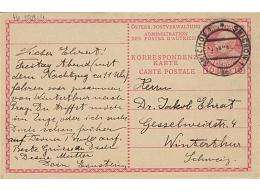'Regards to your old lady'

The ETH-Bibliothek at ETH Zurich (Switzerland) is to post six new Einstein letters to his university friend Jakob Ehrat and the latter's mother Emma Ehrat-Uhlinger on the web. The ETH-Bibliothek currently holds over one hundred Einstein letters.
When he graduated in around 1900, Albert Einstein was the only one of his classmates not to obtain an assistant position at the Federal Polytechnical School (now ETH Zurich). Following a brief stint in Schaffhausen, Einstein took a job at the Patent Office in Berne. The first of the six Einstein letters the ETH-Bibliothek inherited dates from this period of his life. The letter to Emma Ehrat-Ühlinger from 1903 reveals that she had been greatly vexed by Einstein’s phrase “regards to your old lady”. In it, he excuses his faux pas by explaining to her that the proper and official title for the mother of an academic is in fact “the man’s old lady”. Besides, he told her, he’d also used the same salutation in countless letters to his own mother. The contents of the other five letters to Jakob Ehrat are also of a personal nature and show that the friendship continued way beyond their time together at university.
Underestimated genius
Over one hundred letters and documents, sorted according to the biographical stages of Einstein’s life, are available in the ETH-Bibliothek’s online collection: The original letters, however, many of which were written in Sütterlin, are only brought out for promotional purposes nowadays. Many of the letters hail from private collections; others were purchased, including the correspondence between Albert Einstein and the mathematician Conrad Habicht. In one of the most profound letters in the collection dated 1905, Einstein already mentions four of his most notable research projects to Habicht. That same year, he completed a PhD at the University of Zurich and first came up with the idea for the “special theory of relativity”, two years later the “general theory of relativity”. ETH Zurich finally expressed an interest in its alumnus and Einstein was appointed a professor of theoretical physics in 1912. The Archives and Private Collections section at the ETH-Bibliothek contains course programmes from the time that list lectures given by Einstein, such as “Continuum Mechanics” or the “Molecular Theory of Heat”.
Survivor of Nazism and two wives
In the spring of 1914 Einstein moved to Berlin, where he perfected the “general theory of relativity” during his professorship at the Prussian Academy of Sciences. Numerous letters and postcards to the mathematicians Hermann Weyl and David Reichinstein from Einstein’s “Berlin years” (1914-1933) are available on the platform “Einstein Online”. When the Nazis came to power, Einstein emigrated to the United States and took up a position at Princeton University. In the 1950s, he corresponded fervently with his first biographer, Carl Seelig, who also bequeathed his collection of documents from and about Einstein to the ETH-Bibliothek after his death. It was also during this period that Einstein’s correspondence with his university friend Ehrat ended after a long hiatus. In his sixth and final letter in 1952, Einstein shows his wry sense of humour: “I’m doing just fine, considering that I have triumphantly survived Nazism and two wives”.
Provided by ETH Zurich

















